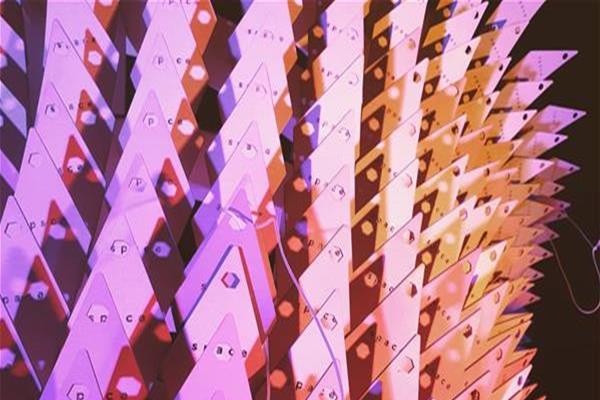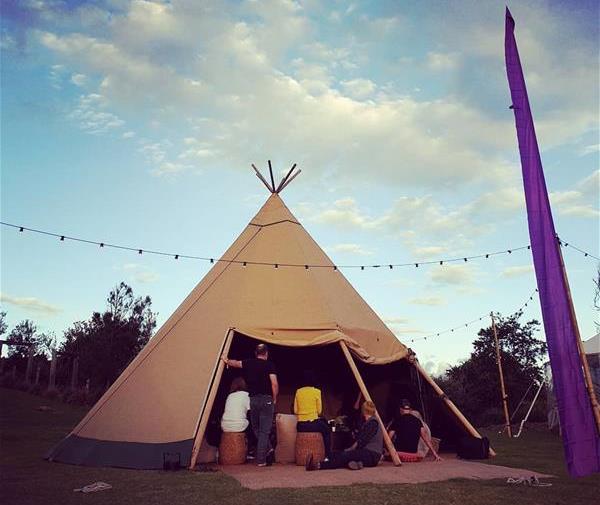by
User Not Found
| Jun 28, 2019
Hamish Curry, Executive Director, Asia Education Foundation

Image: Names of all the S P A C E participants, made into a feature artwork at the venue in Byron Bay.
We’ve all heard the phrases describing the current century as an age of increasing complexity, with often uncertain, volatile, and ambiguous contexts and perspectives (VUCA).
At some point we all feel frustrated and confused by this cacophony of noise and urgency.
What if there was an event experience that tapped into this by bringing a diverse range of people together to discuss, explore, and navigate the complex nature and future of Australia? This was SPACE.
Conceived and coordinated by Cj Holden, Holly Ransom, and Adam Ferrier, the simple construct of SPACE was to bring together ‘unlikely people and unexpected conversations’.
Held over three days in Byron Bay from May 23-25, SPACE brought nearly 200 Australians from different places and contexts together. I was fortunate enough to be invited to come along and add my experiences and enthusiasm for learning and collaboration into the mix.
Set alongside the beach with a series of large open tents, fireplaces, and gathering areas, SPACE created a setting for a cross between an unconference and curated sensory experiences. It’s rare these days to have such events; too many industry-focussed conferences just create more echo-chambers and nodding heads, often leading to little real change and limited opportunities to grow stronger networks.
SPACE has expanded my networks and my perspectives significantly, through the shared openness of participants and the chance for deep discussions.
A key factor in this was telling everyone ‘you are the content’.
People were known for their ‘superpowers’ rather than their jobs. It meant that passive participation was less likely, and ideas could flow openly.
There were over 140 sessions spread over two intense days. Interestingly, many sessions focussed on youth, education, empathy, leadership, culture, and citizenship. Some of the sessions that caught my attention were –
- ‘Education isn’t broken, schooling is’
- ‘What defines us?’
- ‘The Art of Unlearning’
- ‘How can young people lead without throwing eggs?’
- ‘The Future of Design’
- ‘China or bust’
- ‘Narrative Therapy’
- ‘What should the university of tomorrow look like?’
- ‘You’re homeless’
- ‘When people don’t listen’
- ‘Build your empathy muscle’
- ‘Making thinking visible’
- ‘Responsible decision making’
- ‘From Ego-system to Eco-system’
- ‘How to play chicken with the United Nations’
- ‘Deep roots and many routes’
- ‘The Power of Intuition’
- ‘A jobless world’
- ‘Global Village’
- ‘Humanising the future’
- ‘A conversation with the next Generation’
Perhaps my most powerful discussions centred on people being able to question and reflect on issues that they knew to be riddled with assumptions, but in a setting where mutual respect was always paramount.
One session I participated in, exploring the impact and culture of China, was fascinating for the ways in which people were trying to understand how we develop better intercultural relationships, as well as tapping into the business opportunities with China. Another looked at ways we can take a narrative model to solve our reliance and mindset on plastic water bottles.
Given there was so much to choose from, one afternoon I decided to stay in the same spot and see what sessions came into the space – which lead to discussions on the patterns of clinical psychology over 30-years and the need to energise and prioritise creativity in Australia.

Image: S P A C E participants huddled in tents, deep in purposeful conversation.
However, the real highlights for me were a couple of conversations that were directed and chaired by groups of teenagers who had made it to SPACE. I was so impressed at their passion, clarity, and innate leadership for the world around them. These youth described trying to reconcile their apathy that sets in when structures seem to leave them powerless, and the agency when they find their tribe and experience real success in the real world. The mental wellbeing of Australia’s youth is in a delicate balance, but as one youth put it – ‘we identify as global citizens.’
Education came up time and again in so many circles – making me realise just how many stereotypes still prevail about education, as well as the ways education can really shift what opportunities it offers the youth it serves.
These varied conversations were often quite unstructured and less about tools and pragmatics than getting into the hearts and heads of the people in the tents.
People from businesses, politics, media, education, arts, science, technology, marketing and medicine together sharing and searching for answers to some of our nation’s biggest and emerging issues.
There are certainly drawbacks to this format – as I sensed some chat-fatigue, repetition, lack of preparation, and overall cohesion around what a collective like this can achieve. Yet, like so many people there, I could have kept going and would jump at the opportunity to do it all again.
Making space is probably the one thing we have control over.
Putting aside the incessant urgent, giving time to really listening, and acknowledging that age and experience is no measure of a community’s willingness to better navigate and negotiate the future together.
View the S P A C E guest list here.
Comment